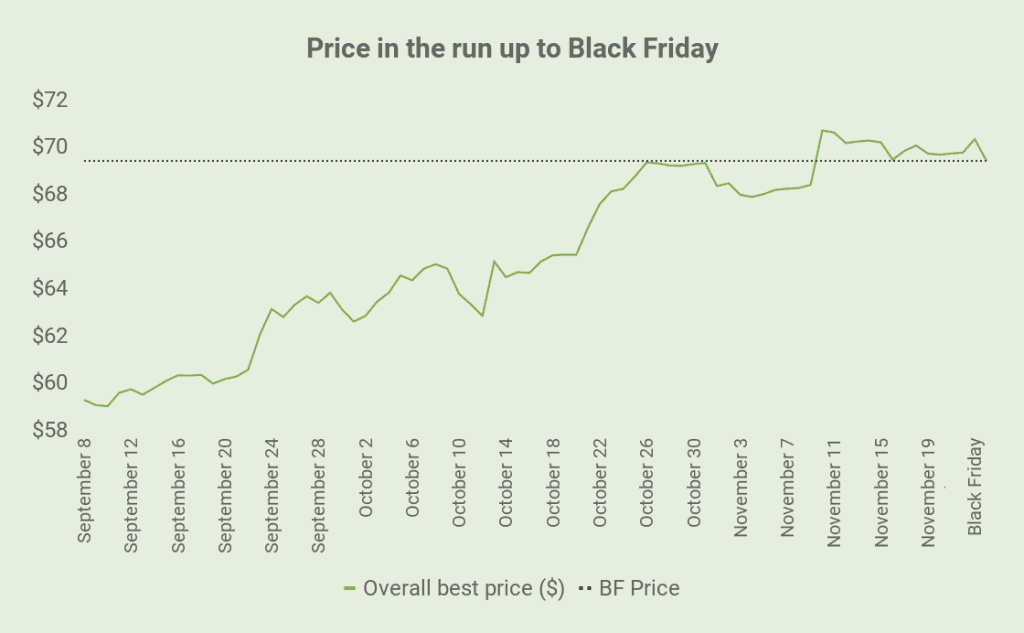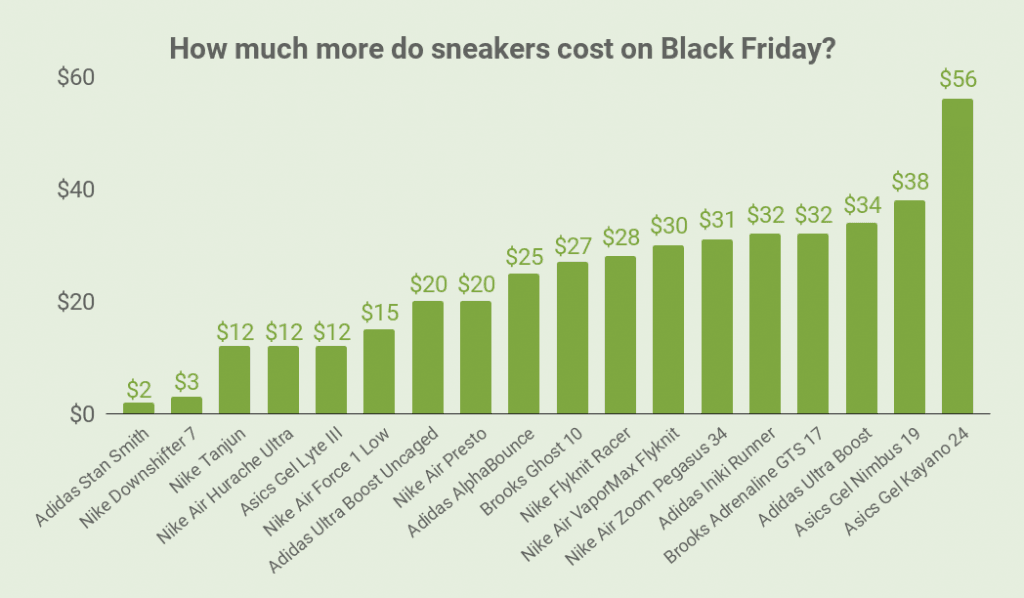Black Friday 2018 is projected to be the biggest shopping day of the holiday season.
According to the BBC, shoppers are expecting to get deals on:
- Electricals
- Clothing and footwear
- Food and groceries
- Health and beauty
- Furniture and clothing
We all know there will be cheap bluetooth speakers, cheap cheap cell phones and cheap sneakers.
Q3 hedge fund letters, conference, scoops etc
But maybe not…
Although Black Friday is often described as the cheapest day of the year, it turns out that might not exactly be the case.
After analyzing more than 1.4 million sneaker prices over the past two years, it turns, Black Friday is the 293rd cheapest day of the year.
That means sneakers are cheaper 80% of the year than they are on Black Friday.
As you can see from the over and under graph, there are only 72 days in the year that sneakers are more expensive than they are on Black Friday.
Basically, if you just went into a sneaker store on a random day, you would be very, very unlucky to pay more than you would on Black Friday.
Those are 1:5 odds.
Is Black Friday ever the cheapest day?
So, as a whole, sneakers are more expensive on Black Friday than they are on many days throughout the year.
But what about individual models?
Well, how about looking at the 100 most popular pairs of sneakers on the market and seeing how many of them were cheapest on Black Friday than any other day.
The results: 1% of all sneakers are cheapest on Black Friday.
Only 1 of the top 100 pairs of sneakers on sale at the moment were at their cheapest price on Black Friday.
It actually turns out that November is the second worst month of the year to buy sneakers with only March being more expensive.
How much more do you pay on Black Friday?
We all agree we’ve been tricked into paying more for our sneakers on Black Friday.
But, the questions is: just how much more are we paying?
The biggest difference comes with a pair of Asics sneakers that cost $56 more on Black Friday than they do on the cheapest day of the year.
Given that the cheapest price of these sneakers over the course of the year was $102, the consumer ends up paying 180% of the cheapest available price.
On average though, you can expect to pay $29.72 more for your sneakers on Black Friday.
That’s not nothing.
In fact, when you consider the average price of a pair of sneakers is around $68, consumers end up paying an additional 44% for sneakers on Black Friday.
Even worse, you’ll actually discover that sneakers the price of sneakers on Black Friday is higher than the average price of a pair of sneakers across the whole year. So, not only are you paying more than the cheapest price on Black Friday, you’re also paying more than the average price.
What happens to prices before Black Friday?
According to the BBC, 10% of those shopping on Black Friday plan on buying clothing and footwear. That’s what makes the footwear market so important to retailers. If they don’t have footwear on sale on Black Friday, they can miss out on the huge sums being spent that day.
But, these sharp discounts can hit the pockets of retailers, and put buyers off from parting with their cash earlier in the month while they wait for the Black Friday sales.
To combat the harm done by discounting, retailers gradually increase the price of their products in the months leading up to Black Friday.
Prices rise gradually in the ten weeks leading up to the Black Friday sales. In the 10 weeks before Black Friday 2017, the average price of a pair of sneakers rose by 17%. That’s almost a fifth.
This movement is very unusual in a fairly short period of time.
Retailers take advantage of consumers during this Black Friday period. Over years and years, prices have tended to be cheaper for certain products and more expensive for others.
It seems that retailers have decided that they can get away with not actually reducing prices on Black Friday because people just assume it is going to be cheaper.
In the weeks leading up to the holiday, we are bombarded with media telling us how great the deals are, where to get the best deals, what we can get at Walmart and Amazon.
This conditions customers to believe that Black Friday is the cheapest day of the year. So, we don’t do our research, we don’t compare prices and we go to the store and see a big label that says 40% off and just believe it.
The question to ask is: 40% off what?
What price has 40% been cut off. Is it the average price the product has been sold at for the past year, or is it a price that was 60% higher than usual that was in place for 4 days, 6 months ago in order to mark down a significant discount for Black Friday?
Even worse, it encourages shoppers to hold off. People don’t make the purchases at cheaper prices because they know Black Friday is coming up. And then, it ends up costing them even more.
The thing is, retailers get away with it because we don’t question them. Traffic remains higher on Black Friday than any other day of the year despite it actually being more expensive.
Consumers do not save money on Black Friday. The data doesn’t lie. 99% of all sneakers are cheaper on another day than Black Friday.









